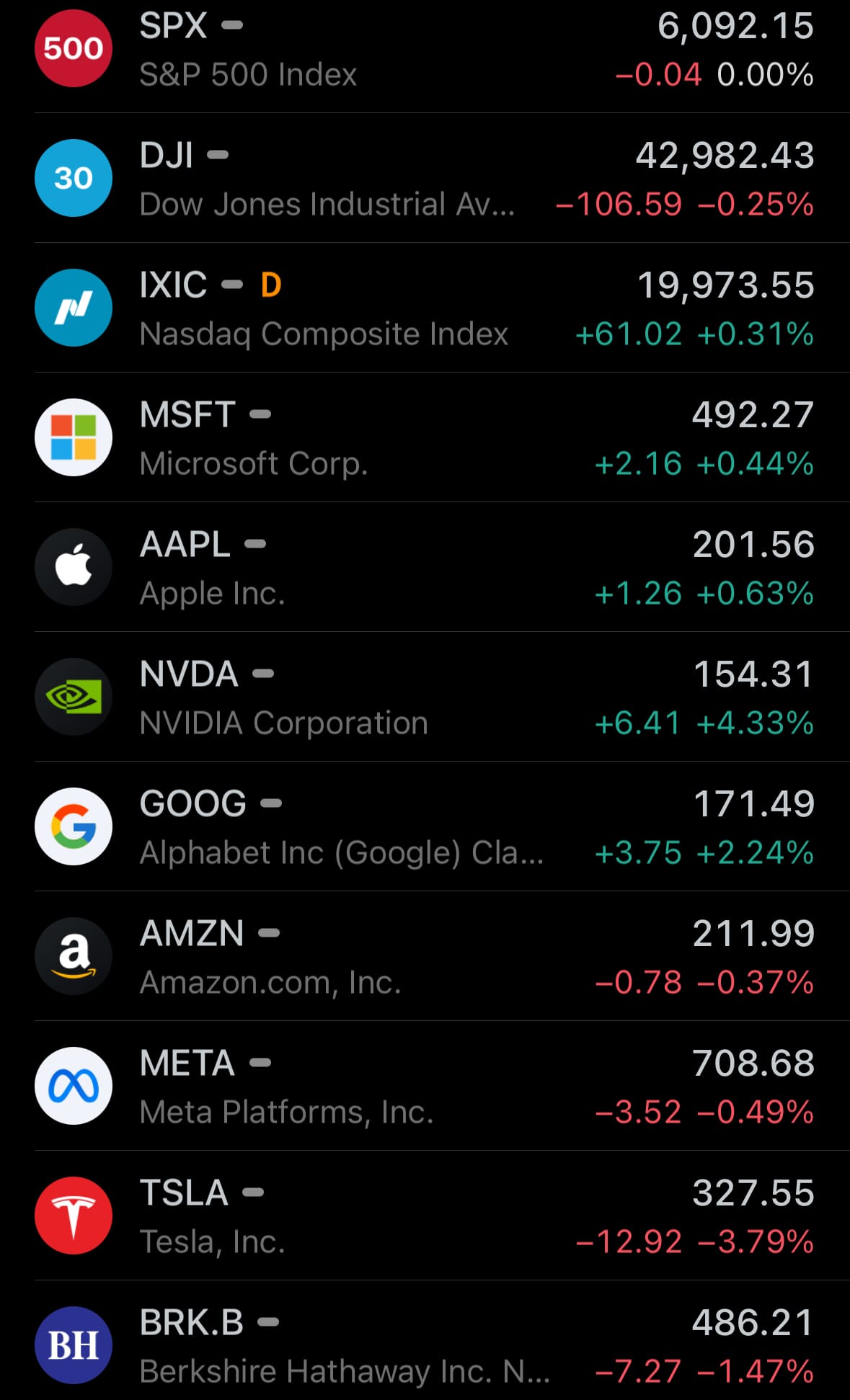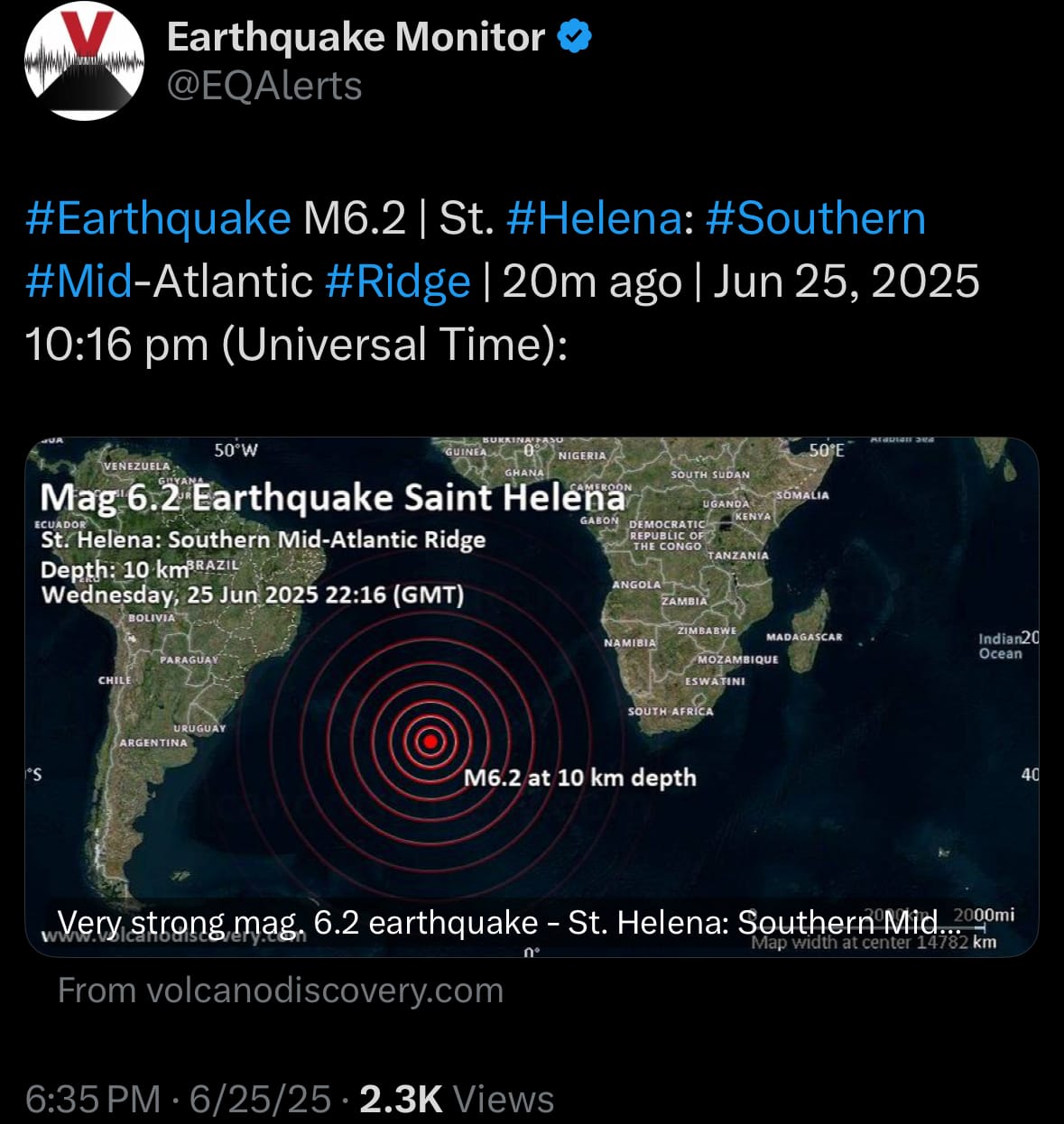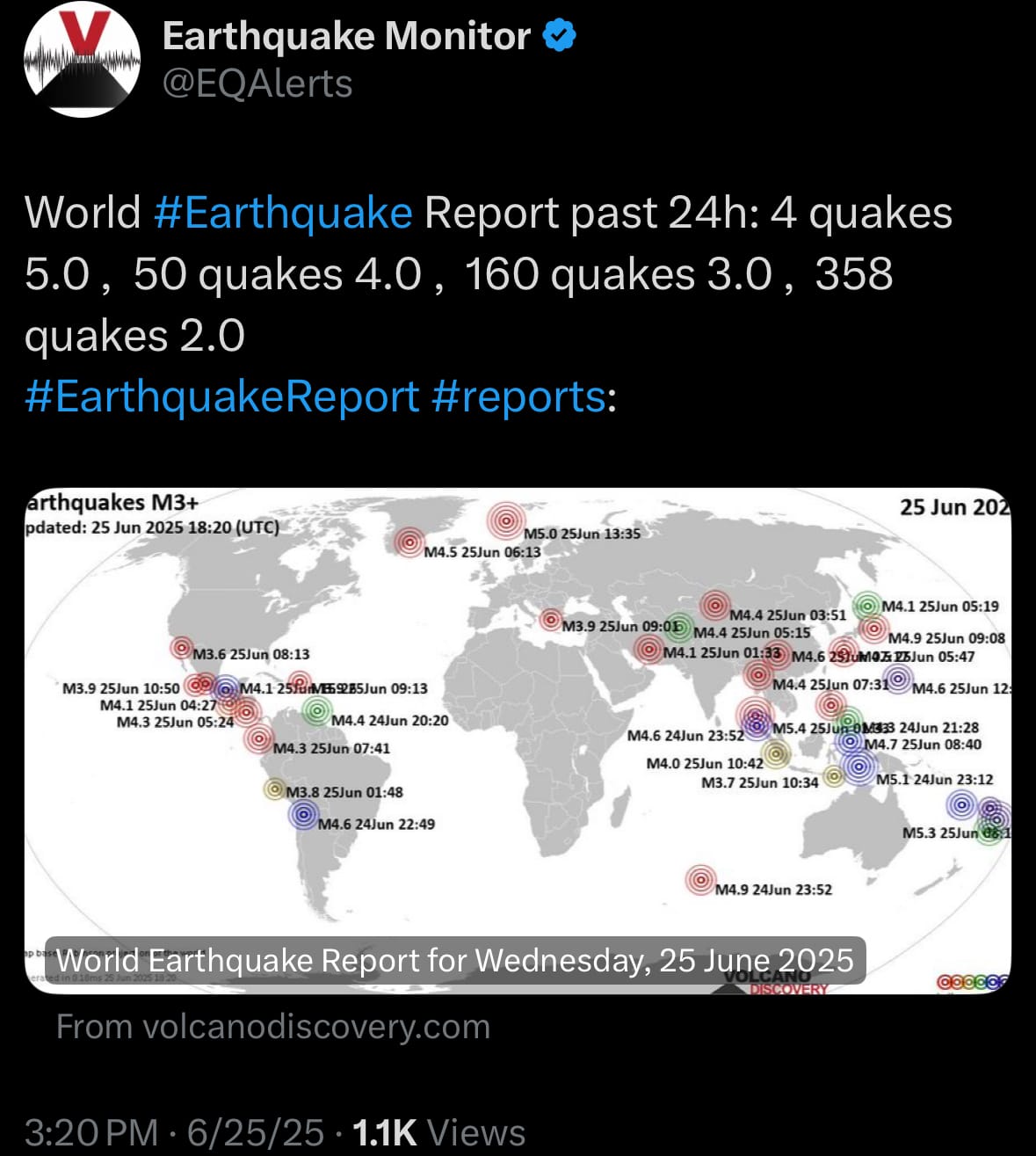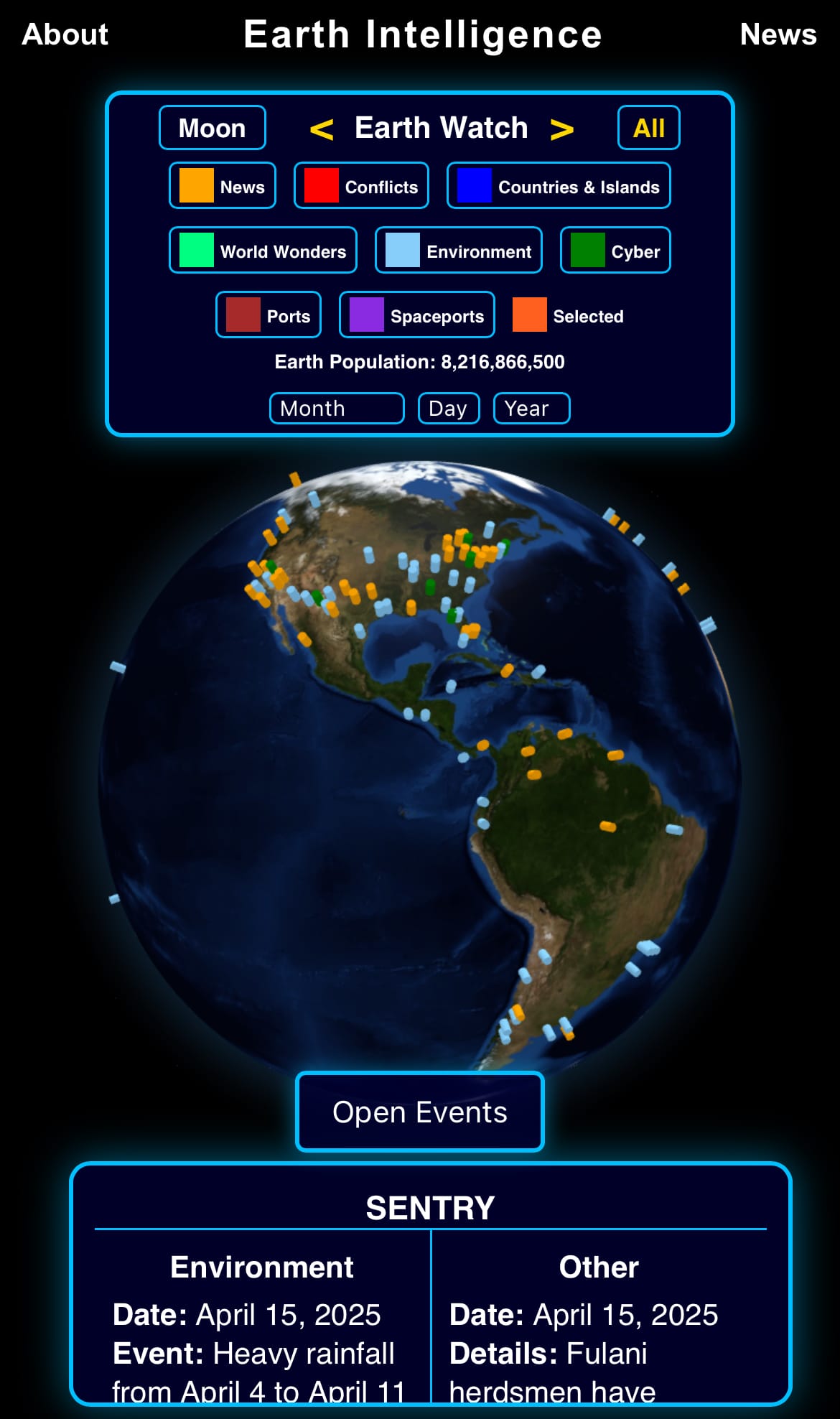Thursday☕️

Trending:
- Yesterday, June 25, 2025, violent protests swept across Kenya, specifically marking the one-year anniversary of the 2024 anti-government demonstrations, and resulted in 16 deaths and over 400 injuries on that day alone. The clashes occurred in cities such as Nairobi, Mombasa, Nakuru, and Kisumu, where police used tear gas, water cannons, and batons to disperse crowds, while protesters retaliated by throwing stones, setting fires, and targeting government buildings. Amnesty Kenya’s Irũngũ Houghton confirmed that most of the 16 deaths on June 25, 2025, were caused by police actions, with the Law Society of Kenya (LSK) reporting 83 serious injuries, including eight from gunshots, and Kenyatta National Hospital treating 56 people, primarily for rubber bullet injuries.

- The 2025 protests were driven by unresolved grievances from the 2024 demonstrations, which saw over 60 deaths due to police crackdowns on protests against proposed tax hikes. Public anger over ongoing corruption, unemployment, rising living costs, and recent incidents, such as the deaths of teacher Albert Ojwang and vendor Boniface Kariuki, further fueled the unrest on June 25, 2025. Police barricaded roads and restricted access to parliament, while the Communications Authority ordered media to halt live coverage, temporarily taking TV stations off air. LSK president Faith Odhiambo condemned the police brutality, and protesters, including Stephanie Marie and Innocent, vowed to continue demanding justice and better leadership, underscoring the persistent tensions between the government and its citizens.
Economics & Markets:
- Yesterday’s U.S. stock market:

- Yesterday’s commodity market:

- Yesterday’s crypto market:

Environment & Weather:
- Yesterday, June 25, 2025, a small tornado struck Largo, Florida, causing significant damage to the Bay Ranch Manufactured Home Communities and Ranchero Village at 7000 Ulmerton Road, shortly after 7 p.m. The storm impacted the mobile home park, lifting one home off its foundation, destroying carports, and scattering debris across yards, with at least seven homes deemed uninhabitable and several others sustaining major or minor damage.

- No serious injuries were reported, though one homeowner sustained minor scrapes and bruises, and emergency crews, including Largo Fire Rescue, responded promptly to assess and assist the affected residents. The small tornado was part of a weather system in Pinellas County, with the National Weather Service issuing a Severe Thunderstorm Warning that evening, noting 60 mph wind gusts and the potential for half-dollar-sized hail. The event underscores the vulnerability of mobile home communities to sudden storms in Florida.


Science & Technology:
- On June 24, 2025, U.S. District Judge William Alsup ruled in the U.S. District Court for the Northern District of California that training AI models on copyrighted books qualifies as fair use under U.S. copyright law, as the process is highly transformative and does not reproduce or compete with the original works. The decision stemmed from a lawsuit filed in August 2024 by authors Andrea Bartz, Charles Graeber, and Kirk Wallace Johnson against Anthropic, the developer of the Claude AI model, who alleged unauthorized use of their works. The judge compared AI training to a reader studying texts to learn, concluding that it supports innovation without infringing copyright.
- However, the court also ruled that Anthropic’s use of over 7 million pirated books to build its training dataset violated copyright law, as it involved unauthorized copying and storage. A separate trial to determine damages for this infringement is scheduled for December 2025, with potential penalties of up to $150,000 per work. This ruling clarifies that while AI training on copyrighted material may be permissible, the method of obtaining those materials is critical, highlighting the balance between technological development and intellectual property rights in ongoing legal debates.
Statistic:
- Largest public e-commerce companies by market capitalization:
- 🇺🇸 Amazon: $2.250T
- 🇨🇳 Alibaba: $273.28B
- 🇨🇳 PDD Holdings (Pinduoduo): $152.10B
- 🇨🇦 Shopify: $147.68B
- 🇦🇷 MercadoLibre: $128.79B
- 🇨🇳 Meituan: $101.14B
- 🇸🇬 Sea Limited: $92.24B
- 🇺🇸 Coupang: $52.56B
- 🇨🇳 Jingdong Mall: $47.48B
- 🇺🇸 Copart: $46.54B
- 🇺🇸 Carvana: $36.92B
- 🇺🇸 eBay: $34.34B
- 🇺🇸 Chewy: $17.59B
- 🇨🇳 JD Health: $17.12B
- 🇯🇵 Rakuten: $11.78B
- 🇺🇸 Instacart (Maplebear Inc.): $11.29B
- 🇯🇵 Monotaro: $10.01B
- 🇯🇵 ZOZO: $9.54B
- 🇭🇰 Alibaba Health Information Technology: $9.47B
- 🇵🇱 Allegro.eu: $9.42B
- 🇩🇪 Zalando: $8.09B
- 🇨🇳 Vipshop: $7.62B
- 🇳🇴 Vend Marketplaces: $7.56B
- 🇮🇳 Nykaa: $6.78B
- 🇺🇸 Wayfair: $6.42B
History:
- E-commerce began in the 1960s with electronic data interchange (EDI), enabling businesses to exchange documents digitally, but it was the 1990s that marked its true rise with the internet's commercialization. The first notable players included Book Stacks Unlimited (1992), an online bookstore, and IBM’s early online retail experiments. In 1994, Netscape introduced secure transactions via SSL, paving the way for consumer trust. Jeff Bezos launched Amazon in 1995 as an online bookstore, while eBay emerged as a peer-to-peer auction platform. The dot-com boom (1997–2000) fueled rapid growth, with companies like Yahoo! and early retailers like Pets.com, though many failed during the 2000 bust due to unsustainable models. These early players laid the groundwork for modern e-commerce by establishing online marketplaces and payment systems.
- The 2000s saw e-commerce evolve with improved broadband, mobile commerce, and global platforms. Amazon expanded beyond books, introducing innovations like Prime (2005) and AWS, solidifying its dominance. The rise of smartphones and apps in the late 2000s, coupled with social media marketing, transformed consumer behavior, enabling seamless shopping experiences. Alibaba emerged in China, dominating Asia, while Walmart and others adapted to compete online. Today, Amazon is the largest player globally, with a 2024 market share of ~38% in U.S. e-commerce sales, driven by its vast logistics network, subscription model, and AI-driven personalization. E-commerce continues to grow, integrating AR/VR, voice commerce, and sustainability, with global sales projected to exceed $7 trillion by 2025.
Image of the day:

Thanks for reading!
Earth is complicated, we make it simple.
Click image to view the Earth Intelligence System:



Support/Suggestions Email:
earthintelligence@earthintel.news




